Realism, Ethics and U.S. Foreign Policy
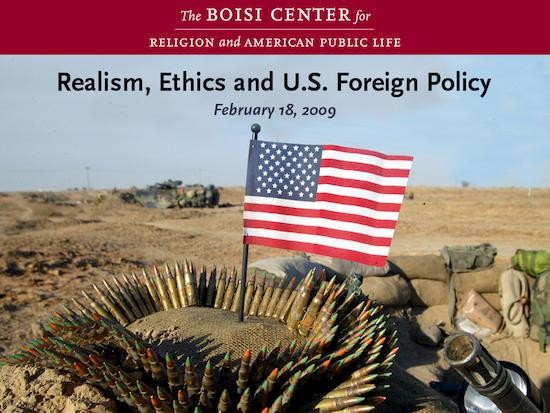
Andrew J. Bacevich, Boston University
Fr Bryan Hehir, Harvard University
Jean Bethke Elshtain, University of Chicago
Date: February 18, 2009
Abstract
Realism is a school of thought in international relations that asserts the need to carefully assess and project national power to achieve maximum stability and security among states. Some political realists (such as Henry Kissinger) deny any role to ethics or morality in this process, while others (such as Walter Lippmann and Reinhold Niebuhr) argue that moral issues must be a part of any serious realist analysis. This panel brings together three of the nation’s most prominent scholars on religion, ethics and international politics to discuss the role of realism and ethics in U.S. foreign policy, with a focus on the new directions expected from President Obama and Secretary of State Clinton.
Speaker Bios
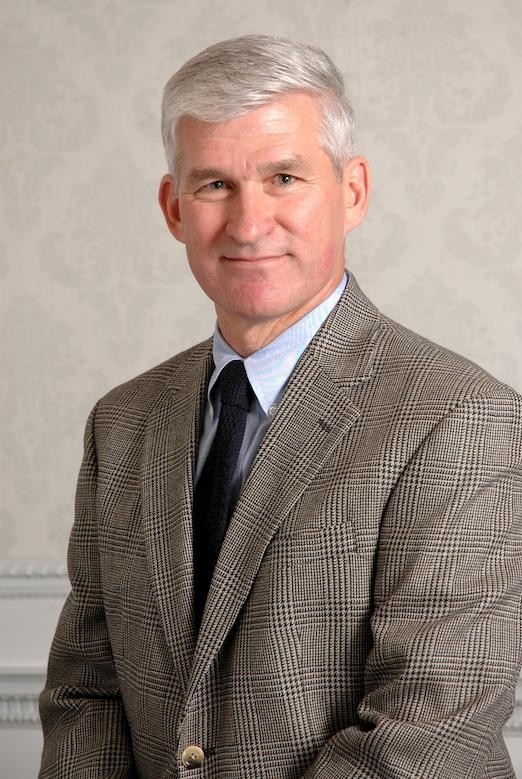
Andrew J. Bacevich is professor of history and international relations at Boston University. A graduate of the U.S. Military Academy, he received his Ph.D. in American diplomatic history from Princeton. Before joining the faculty of Boston University in 1998, he taught at West Point and at Johns Hopkins. Bacevich is the author of several books, to include The New American Militarism: How Americans Are Seduced by War (2005) and American Empire: The Realities and Consequences of U. S. Diplomacy (2002). He is the editor of The Long War: A New History of U. S. National Security Policy since World War II (2007) and Imperial Tense: Problems and Prospects of American Empire (2003). His essays and reviews have appeared in a wide variety of scholarly and general interest publications to include The Atlantic Monthly, The Wilson Quarterly, The London Review of Books, Foreign Affairs, Foreign Policy, The Nation, and The New Republic. His op-eds have appeared in The New York Times, Washington Post, Wall Street Journal, Financial Times, International Herald Tribune, Boston Globe, and Los Angeles Times among other newspapers. Bacevich is a member of the Council on Foreign Relations.
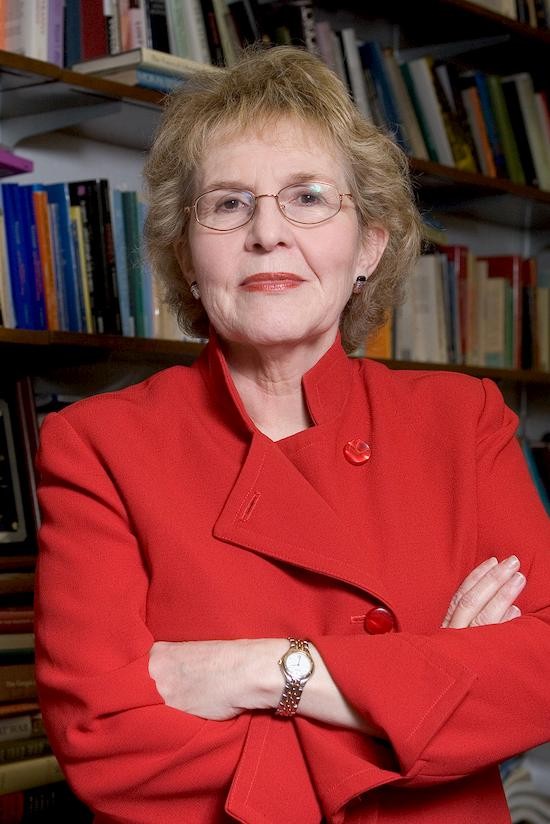
Jean Bethke Elshtain is the Laura Spelman Rockefeller Professor of Social and Political Ethics at the University of Chicago, where she holds appointments in the Divinity School, the Department of Political Science and the Committee on International Relations. In the Fall semesters she holds the Thomas and Dorothy Leavey Chair in the Foundations of American Freedom at Georgetown University. Professor Elshtain is a political philosopher whose task has been to show the connections between our political and ethical convictions. In addition to her essays in numerous journals of civic opinion, she is the editor of seven books and author of more than a dozen more, including Public Man, Private Woman; Democracy on Trial; Augustine and the Limits of Politics; and Just War against Terror: The Burden of American Power in a Violent World. Her most recent book, published in 2008, is Sovereignty: God, State and Self, an early version of which was delivered as the prestigious Gifford Lectures at the University of Edinburgh in 2006. Professor Elshtain is a fellow of the American Academy of Arts and Sciences, and in 2006 was appointed by President George W. Bush to the Council of the National Endowment for the Humanities. Her Ph.D. In political science is from Brandeis University.

Rev. J. Bryan Hehir is the Parker Gilbert Montgomery Professor of the Practice of Religion and Public Life at the Kennedy School of Government at Harvard University. He is also the Secretary for Social Services in the Archdiocese of Boston. Prior to assuming these positions, Father Hehir served as President and CEO of Catholic Charities USA from 2001-2003. Before that he served on the staff of the U.S. Catholic Conference of Bishops in Washington, D.C. and served on the faculty at Georgetown University. He also served as faculty and later Dean of Harvard Divinity School. He was named a MacArthur Fellow in 1984. His research and writing focus on issues of ethics and foreign policy, Catholic social ethics and the role of religion in world politics and in American society. Hehir’s publications include: “The Moral Measurement of War: A Tradition of Continuity and Change”; “Military Intervention and National Sovereignty”; “Catholicism and Democracy”; “Social Values and Public Policy: A Contribution from a Religious Tradition”; and “The Moral Dimension in the Use of Force."
Event Photos
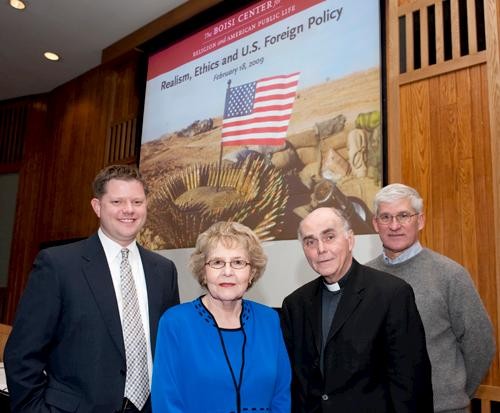
From left to right: Erik Owens, Jean Bethke Elshtain, Fr. Bryan Hehir, Andrew J. Bacevich
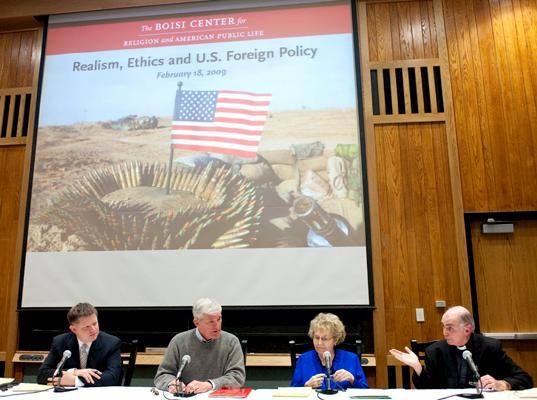
Panel from left to right: Erik Owens, Andrew J. Bacevich, Jean Bethke Elshtain, Fr. Bryan Hehir
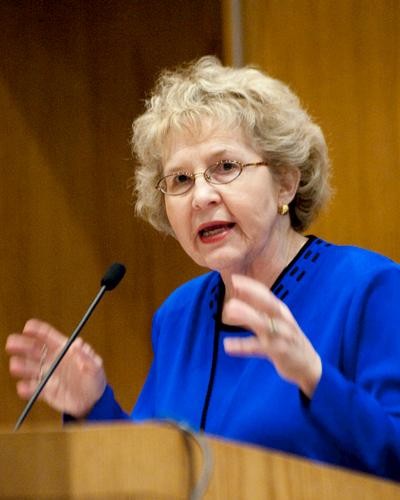
Jean Bethke Elshtain
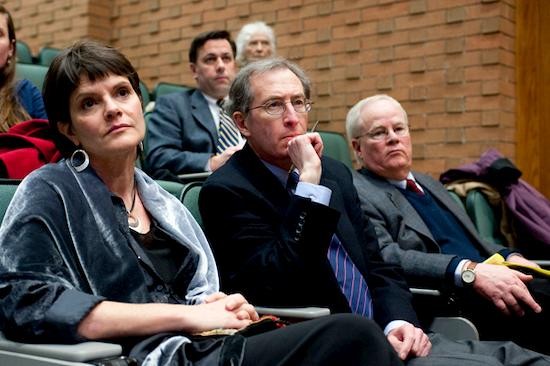
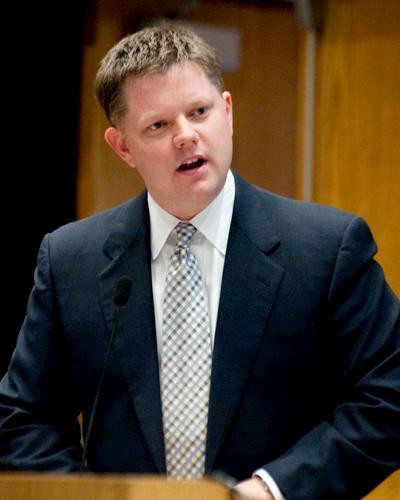
Erik Owens

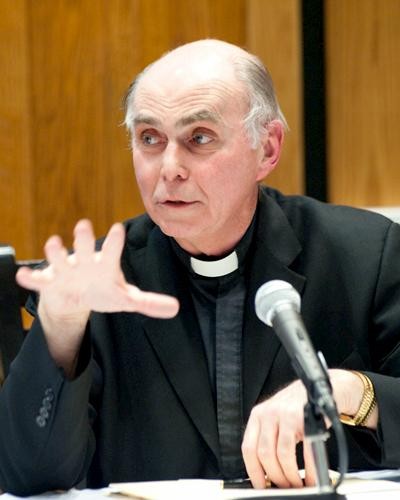
Fr. Bryan Hehir
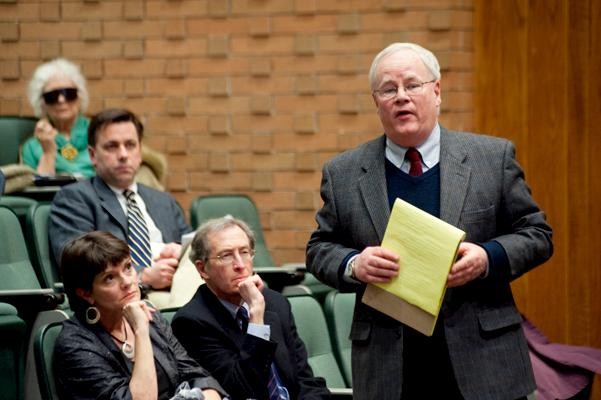
Fr. Hollenbach asks the panel a question


Event Recap
Realism is a school of thought in international relations that asserts the need to carefully assess and project national power to achieve maximum stability and security among states. Some political realists (such as Henry Kissinger) deny any role to ethics or morality in this process, while others (such as Walter Lippmann and Reinhold Niebuhr) have argued that moral issues must be a part of any serious realist analysis. On February 18, less than a month after President Obama promised in his inaugural address foreign policy that would not sacrifice ideals for security, the Boisi Center brought together three of the nation’s most influential scholars on political realism. Andrew Bacevich (Professor of History and International Relations, Boston University), Jean Bethke Elshtain (Laura Spelman Rockefeller Professor of Social and Political Ethics, University of Chicago) and Rev. J. Bryan Hehir (Parker Gilbert Montgomery Professor of the Practice of Religion and Public Life at the Kennedy School of Government, Harvard University) spoke to a packed audience about the role of realism and ethics in U.S. foreign policy at the dawn of the Obama administration.
Citing the preamble of the U.S. Constitution, Bacevich argued that the President is first and foremost obligated to “provide for the common defense, promote the general welfare and secure the blessings of liberty to ourselves and our posterity.” Our posterity—future generations of Americans—cannot enjoy our present quality of life, he said, without a balanced budget, a cap on federal entitlements, alleviation of the current account deficit, an end to our dependence on foreign oil and the restoration of the environment and its protection from further harm. Likewise, a clearheaded appraisal of our common defense counsels us to abandon the dominant view of “national security” as requiring global hegemony instead use our military for defensive purposes only. President Obama’s moral obligation to the American people demands no less.
Professors Elshtain and Hehir both began with historical perspectives, differentiating the classical form of political realism, which completely eschewed talk of morality and ethics, from the modern version, which is open in varying degrees to ethical considerations. Elshtain focused her remarks upon a particular form of modern realism epitomized by the work of Reinhold Niebuhr. Christian realism, as this view has come to be known, argues that a theological understanding of human nature—as invested with natural rights and capable of transcendence, but bound by a sinful pride that refuses to admit the limits of our rationality and altruism—affords a much more accurate portrait of international relations than its alternatives. President Obama has claimed Reinhold Niebuhr as an important influence in his thinking, and Elshtain skillfully outlined the sort of policy critiques Christian realism could offer the new administration.
Hehir faulted classical realism for over-emphasizing the moral importance of nation-states, reminding the audience that while states are crucial political entities, they must always have relative, not absolute, moral value. Human dignity transcends national boundaries, and political leaders should understand the world as a human community, not simply a collection of states. With regard to the challenges facing the new president, Hehir argued that Obama needs to reclaim a sort of Niebuhrian foreign policy that embraces both moral realism and (in opposition to the Bush administration) limits to American power and influence. This will entail careful attention to our responsibilities in Iraq and Central Asia, along with a redefinition (and limitation) of the scope of our present, “war on terror.”
Read More
Further Reading
By Jean Bethke Elshtain:
- Jean Bethke Elshtain, Sovereignty: God, State and Self (BasicBooks, 2008)
- Jean Bethke Elshtain, “Against the New Utopianism,” Ethics & International Affairs 19.2 (2005): 91-95.
- Jean Bethke Elshtain, “International Justice as Equal Regard and the Use of Force,” Ethics & International Affairs 17.2 (Fall 2003): 63-75.
- Jean Bethke Elshtain, Just War Against Terror: The Burden of American Power in a Violent World (BasicBooks, 2003).
By Andrew Bacevich:
- Andrew Bacevich, "American Triumphalism: A Postmortem," Commonweal 30, Jan 2009.
- Andrew Bacevich, The Limits of Power: The End of American Exceptionalism (Metropolitan, 2008)
- Andrew Bacevich, "The Realist Presumption," Boston Globe, 6 Nov 2005.
By J. Bryan Hehir:
- J. Bryan Hehir, “Religion, Realism and Just Intervention,” in Dionne/Elshtain/Drogosz, eds., Liberty and Power (Brookings, 2004), 11-33.
- J. Bryan Hehir, “The Moral Measurement of War: A Tradition of Change and Continuity,” in The Sacred and the Sovereign (Georgetown, 2003), 41-65.
National Security Strategy and Commentary:
- “The National Security Strategy of the United States,” September 2002.
- “Preemption, Iraq and Just War: A Statement of Principles,” 14 November 2002.
On Reinhold Niebuhr and Christian Realism:
- Reinhold Niebuhr, The Irony of American History (Chicago, 2008); introduction by Andrew Bacevich
- Robin Lovin, Christian Realism and the New Realities (Cambridge, 2008).
- John Carlson, “Is There a Christian Realist Theory of War and Peace? Reinhold Niebuhr and Just War Thought,” Journal of the Society of Christian Ethics 28.1 (Spring/Summer 2008).
- Articles on Obama and Niebuhr in the Presidential campaign (2007/08).
- Reinhold Niebuhr, “Why the Christian Church is Not Pacifist,” and “Must We Do othing?” in Richard Miller, ed., War in the 20th Century: Sources in Theological Ethics (Westminster/JKP, 1992), 3-18, 28-46.
Multimedia:
"Speaking of Faith" with Krista Tippett by American Public Media. February 12, 2009.
"Obama's Theologian: The Legacy of Reinhold Nieburh and the Future of Christian Realism"
David Brooks and E.J. Dionne on Reinhold Niebuhr and the American Present

